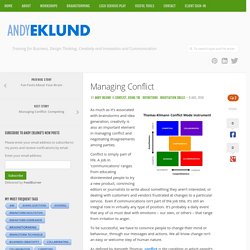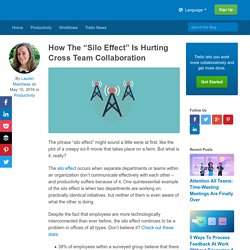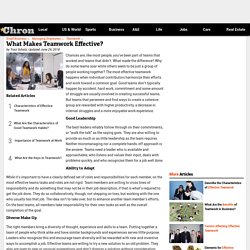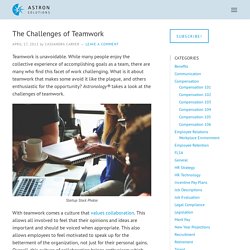

Role of Standards and Training in Preparing for Accreditation. We use cookies to enhance your experience on our website.By continuing to use our website, you are agreeing to our use of cookies.

You can change your cookie settings at any time. The Benefit of Interactive Learning. Watch a video of the Master Class with Eric Mazur.

Eric Mazur, Balkanski Professor of Physics and Applied Physics at the Harvard School of Engineering and Applied Sciences, knows all too well that a lecture on physics could put most people in a classroom to sleep. It is something that he learned the hard way. As part of Master Class, a series that began at the Ed School a year ago as an opportunity to celebrate and investigate great teaching happening throughout Harvard University, Mazur's session, "Confessions of a Converted Lecturer," explored how he developed and practices peer instruction — a method for teaching large lecture classes interactively. Silo Mentality. How Aviation Safety Managers Can Deal with Silo Mentality. Aviation Safety Managers Battling Organizational Silos Effective aviation safety management systems (SMS) are implemented throughout an entire organization, and not merely for flight ops and airside operations.

Unfortunately, there is a major problem with many safety cultures in the aviation industry. Safety is managed at the department level or at the division level of many inefficient aviation companies. Safety managers today are challenged with implementing an effective SMS, yet have to overcome the "silo mentality. " This article discusses why the silo mentality exists and how safety managers can work to break down silos to enhance the safety culture at their airline or airport. Related Aviation Safety Manager Articles. Top 10 Team Building Activities. Factors Affecting Effective Teamwork. Teamwork and patient safety in dynamic domains of healthcare: a review of the literature. - PubMed - NCBI.
How to Define an Effective Team? 11 Characteristics. Conflict handling styles. Managing Conflict - Andy Eklund. As much as it’s associated with brainstorms and idea generation, creativity is also an important element in managing conflict and negotiating disagreements among parties.

Conflict is simply part of life. A job in ‘communications’ ranges from educating disinterested people to try a new product, convincing editors or journalists to write about something they aren’t interested, or dealing with customers and vendors frustrated at changes to a particular service. Even if communications isn’t part of the job title, it’s still an integral role in virtually any type of position. It’s probably a daily event that any of us must deal with emotions – our own, or others – that range from irritation to anger. To be successful, we have to convince people to change their mind or behaviour, through our messages and actions. As defined by Kenneth Thomas, conflict is the condition in which people’s concerns (the things they care about) appear to be incompatible. How To Identify And Improve Your Conflict Management Style. 5 Conflict Management Styles for Different Personality Types.
Conflict, in any setting, is frustrating and uncomfortable.

Like anyone else, I wish we lived in a world of complete peace, compliance, and agreement. Unfortunately, that's not the case. You may avoid conflict in the workplace like the plague. How The “Silo Effect” Is Hurting Cross Team Collaboration. The phrase “silo effect” might sound a little eerie at first, like the plot of a creepy sci-fi movie that takes place on a farm.

But what is it, really? The silo effect occurs when separate departments or teams within an organization don’t communicate effectively with each other – and productivity suffers because of it. One quintessential example of the silo effect is when two departments are working on practically identical initiatives, but neither of them is even aware of what the other is doing. Despite the fact that employees are more technologically interconnected than ever before, the silo effect continues to be a problem in offices of all types. Don’t believe it? Geographical distances, physical spaces, managerial differences, security issues, among other things, are all reasons why office silos may develop.
But too much segmentation hurts productivity, profitability, and inter-office cohesion. ‘The Silo Effect,’ by Gillian Tett. Competition Or Collaboration: Which Will Help Your Team Produce The Best Results? What makes for a better work culture: competition or collaboration?

It’s a question C-suite executives are asking with more frequency — perhaps because reported rivalries among White House staffers have them wondering about the most effective approach for their own leadership teams. Does encouraging rivalry result in everyone bringing their A-game? When the executives I work with ask me this question, I answer by sharing a story from my own personal experience.
At one point in my career, I worked for an organization where the CEO created intense competition among the leadership team. How to Encourage Meaningful and Needed Conflict at Work. Conflict avoidance is most frequently the topic when a conflict in organizations is discussed.

Conflict resolution, as quickly as possible, is the second most frequent topic. It is bad news because meaningful work conflict is a cornerstone in healthy, successful organizations. Conflict is necessary for effective problem solving and for effective interpersonal relationships. These statements may seem unusual to you. Elements for Effective Teamwork. What Makes Teamwork Effective? Chances are, like most people, you've been part of teams that worked and teams that didn't.

What made the difference? Why do some teams soar while others seem to be just a group of people working together? The most effective teamwork happens when individual contributors harmonize their efforts and work toward a common goal. Good teams don’t typically happen by accident; hard work, commitment and some amount of struggle are usually involved in creating successful teams. The Challenges of Teamwork - Astron Solutions. Teamwork is unavoidable.

While many people enjoy the collective experience of accomplishing goals as a team, there are many who find this facet of work challenging. What is it about teamwork that makes some avoid it like the plague, and others enthusiastic for the opportunity? How Much Does Poor Teamwork Cost You? – The Team Space. For me, it’s a quiet assassin. A ninja, if you will. Poor teamwork has an often unseen but lethal ability to derail what you are trying to achieve and cost you a lot. Here’s some key things that will happen if your team is not up to scratch. Unhealthy Conflict I deliberately use the word unhealthy here, as good teams will have good conflict – opportunities to debate, discuss, work out, agree and decide on action. How Much Does Poor Teamwork Cost You? – The Team Space. 5 Reasons Why Leadership Is In Crisis.
‘A startling 86% of respondents to the Survey on the Global Agenda agree that we have a leadership crisis in the world today.’ according to the World Economic Forum in 2015. There is an alarmingly weak correspondence between power and competency. Those in power are not necessarily up to the job of discharging their responsibilities to the benefit of those they lead.
Here are five of the primary reasons why: Obsession with Outcomes Outcomes are the last link in the chain of cause and effect. To grow a pumpkin you need four elements - earth, air, fire (warmth) and water - and a seed. Just like the pumpkin, you have absolutely no idea exactly how a business enterprise will turn out in terms of its form, size and impact. So when leaders fixate on outcomes such as share price and profit, they do so to the detriment of the causal factors that will determine the quality of those outcomes. Crisis Leadership - Tucker/Hall. When a crisis arises, the first thing people often look for is a leader: the person who knows how to solve the problem and will take the necessary steps to do so. Very few individuals are experts in handling crisis situations. Inexperienced leaders can make rash decisions, react too quickly to the situation, or worse, not react at all in hopes that the situation will work itself out.
Nowadays, with the way information travels instantaneously, crisis situations typically do not “just work themselves out.” You need to intervene before the situation escalates. 5 Reasons Why Leadership Is In Crisis. How to Deal with Resistance to Change. TEDxPerth - Jason Clarke - Embracing Change. Why is Teamwork in Health Care Important? Teamwork: Collaboration and enhanced communication Interdisciplinary teamwork is an important model for delivering health care to patients. Why communication is a patient safety issue. Effective and efficient communication can help create a culture of excellence which in turn delivers value for patients, families, and fellow caregivers.
This value enhances outcomes, safety, and efficiency of care. It also helps patients go home with a plan to restore health and lessen the chances of repeat visits and hospital readmissions. A study at the University of California, San Francisco, found more than a quarter of hospital readmissions could be avoided with better communication among healthcare teams and between providers and patients. “A culture of safety is dependent upon moment to moment conversations between caregivers and patients,” says William Maples, MD, CEO of The Institute for Healthcare Excellence.
Google Image Result for. How Much Does Poor Teamwork Cost You? – The Team Space. Five essential ingredients for a quality culture. "Quality lies in culture. Values are what constitute True Quality" Over the last few decades quality and productivity have surfaced as a major areas of concern for businesses. With the reduction of geographical barriers and the pressures of competing in the global marketplace, operational and service excellence have become necessities for companies to remain globally competitive.
But how do you make sure that all employees minds are focused on delivering a quality product or service? The foundation of any quality improvement is to develop a "quality culture" or mindset within the organization and integrate it throughout the company. Improving the Quality of Your Company's Teamwork. The Challenges of Teamwork - Astron Solutions. Effective Teams - The Right Ingredients? - The Management Centre. Improving the Quality of Your Company's Teamwork.